5 books about Schwartz, Anna J.
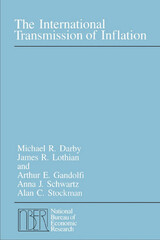
The International Transmission of Inflation
Michael R. Darby, James R. Lothian, Arthur E. Gandolfi, Anna J. Schwartz, and Al
University of Chicago Press, 1984
Inflation became the dominant economic, social, and political problem of the industrialized West during the 1970s. This book is about how the inflation came to pass and what can be done about it. Certain to provoke controversy, it is a major source of new empirical information and theoretical conclusions concerning the causes of international inflation.
The authors construct a consistent data base of information for eight countries and design a theoretically sound model to test and evaluate competing hypotheses incorporating the most recent theoretical developments. Additional chapters address an impressive variety of issues that complement and corroborate the core of the study. They answer such questions as these: Can countries conduct an independent monetary policy under fixed exchange rates? How closely tied are product prices across countries? How are disturbances transmitted across countries?
The International Transmission of Inflation is an important contribution to international monetary economics in furnishing an invaluable empirical foundation for future investigation and discussion.
The authors construct a consistent data base of information for eight countries and design a theoretically sound model to test and evaluate competing hypotheses incorporating the most recent theoretical developments. Additional chapters address an impressive variety of issues that complement and corroborate the core of the study. They answer such questions as these: Can countries conduct an independent monetary policy under fixed exchange rates? How closely tied are product prices across countries? How are disturbances transmitted across countries?
The International Transmission of Inflation is an important contribution to international monetary economics in furnishing an invaluable empirical foundation for future investigation and discussion.
[more]
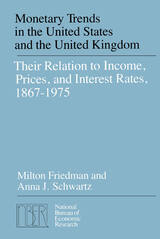
Monetary Trends in the United States and the United Kingdom
Their Relations to Income, Prices, and Interest Rates
Milton Friedman and Anna J. Schwartz
University of Chicago Press, 1982
The special task of this book is to present a statistical and theoretical analysis of the relation between the quantity of money and other key economic magnitudes over periods longer than those dominated by cyclical fluctuations-hence the term trends in the title. This book is not restricted to the United States but includes comparable data for the United Kingdom.
[more]
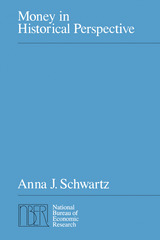
Money in Historical Perspective
Anna J. Schwartz
University of Chicago Press, 1987
Modern monetary economics has been significantly influenced by the knowledge and insight brought to the field by the work of Anna J. Schwartz, an economist whose career has spanned almost half a century. Her contributions evidence a broad expertise in international history and policy, and an ability to apply the results of her careful historical research to current issues and debates. Money in Historical Perspective is a collection of sixteen of her papers selected by Michael D. Bordo and Milton Friedman. Grouped into three sections, the essays constitute a number of Dr. Schwartz's most cited articles on the subject of monetary economics, many of which are no longer readily accessible.
In the papers in part I, dating from 1947 to the present, Dr. Schwartz examines money and banking in the United States and the United Kingdom from a historical perspective. Her investigation of the historical evidence linking economic instability to erratic monetary behavior—this behavior itself a product of discretionary monetary policy—has led her to argue for the importance of stable money, and her writings on these issues over the last two decades form part II. The volume concludes with four recent articles on international monetary arrangements, including Dr. Schwartz's well-known work on the gold standard.
This volume of classic essays by Anna Schwartz will be a useful addition to the libraries of scholars and students for its exemplary historical research and commentary on monetary systems.
In the papers in part I, dating from 1947 to the present, Dr. Schwartz examines money and banking in the United States and the United Kingdom from a historical perspective. Her investigation of the historical evidence linking economic instability to erratic monetary behavior—this behavior itself a product of discretionary monetary policy—has led her to argue for the importance of stable money, and her writings on these issues over the last two decades form part II. The volume concludes with four recent articles on international monetary arrangements, including Dr. Schwartz's well-known work on the gold standard.
This volume of classic essays by Anna Schwartz will be a useful addition to the libraries of scholars and students for its exemplary historical research and commentary on monetary systems.
[more]
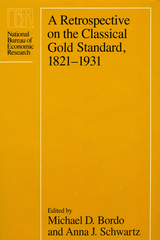
A Retrospective on the Classical Gold Standard, 1821-1931
Edited by Michael D. Bordo and Anna J. Schwartz
University of Chicago Press, 1984
This is a timely review of the gold standard covering the 110 years of its operation until 1931, when Britain abandoned it in the midst of the Depression. Current dissatisfaction with floating rates of exchange has spurred interest in a return to a commodity standard. The studies in this volume were designed to gain a better understanding of the historical gold standard, but they also throw light on the question of whether restoring it today could help cure inflation, high interest rates, and low productivity growth.
The volume includes a review of the literature on the classical gold standard; studies the experience with gold in England, Germany, Italy, Sweden, and Canada; and perspectives on international linkages and the stability of price-level trends under the gold standard. The articles and commentaries reflect strong, conflicting views among hte participants on issues of central bank behavior, purchasing-power an interest-rate parity, independent monetary policies, economic growth, the "Atlantic economy," and trends in commodity prices and long-term interest rates. This is a thoughtful and provocative book.
The volume includes a review of the literature on the classical gold standard; studies the experience with gold in England, Germany, Italy, Sweden, and Canada; and perspectives on international linkages and the stability of price-level trends under the gold standard. The articles and commentaries reflect strong, conflicting views among hte participants on issues of central bank behavior, purchasing-power an interest-rate parity, independent monetary policies, economic growth, the "Atlantic economy," and trends in commodity prices and long-term interest rates. This is a thoughtful and provocative book.
[more]
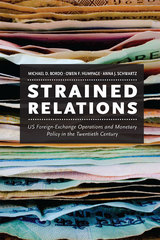
Strained Relations
US Foreign-Exchange Operations and Monetary Policy in the Twentieth Century
Michael D. Bordo, Owen F. Humpage, and Anna J. Schwartz
University of Chicago Press, 2015
During the twentieth century, foreign-exchange intervention was sometimes used in an attempt to solve the fundamental trilemma of international finance, which holds that countries cannot simultaneously pursue independent monetary policies, stabilize their exchange rates, and benefit from free cross-border financial flows. Drawing on a trove of previously confidential data, Strained Relations reveals the evolution of US policy regarding currency market intervention, and its interaction with monetary policy. The authors consider how foreign-exchange intervention was affected by changing economic and institutional circumstances—most notably the abandonment of the international gold standard—and how political and bureaucratic factors affected this aspect of public policy.
[more]
READERS
Browse our collection.
PUBLISHERS
See BiblioVault's publisher services.
STUDENT SERVICES
Files for college accessibility offices.
UChicago Accessibility Resources
home | accessibility | search | about | contact us
BiblioVault ® 2001 - 2024
The University of Chicago Press









